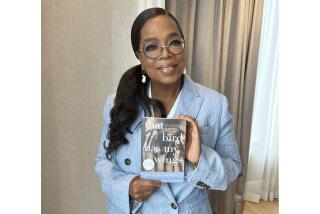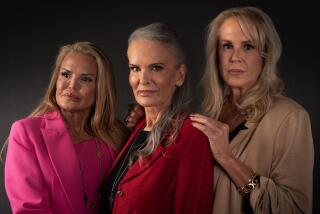THE SIMPSON VERDICTS : Activists Lament Verdict but Applaud Focus on Abuse
Amid the chaos outside the Los Angeles Criminal Courts Building on Tuesday, a small-boned, blond women stood quietly at the curb, weeping behind dark glasses.
The woman, Deborah Plewniak, explained that she could not stay put at her job after the verdict was read, that she had lived with an abusive husband for eight years and now counseled victims of domestic violence.
“I don’t understand,” the 36-year-old woman said plaintively as a crush of celebrants swirled around her, rejoicing in a lightning verdict that set O.J. Simpson free. “I feel like we are so unevolved. We need to deal with domestic violence in this country.”
On the other side of town, another woman of similar sentiment fought back tears. “I want to cry, but I’m holding it back,” said Kathryn Davis-Finch, an African American graduate student at Loyola Marymount University, who had come with her classmates to tour the Museum of Tolerance, a visit that was postponed after the verdict.
“I am feeling so powerless,” continued Davis-Finch, who is studying to be an art therapist. “This outcome speaks to our oppression. How do we get justice as women?”
The laments of these two women echoed around Los Angeles and across America as victims of domestic violence and their advocates pondered the end of a trial that they said had brought a bonanza of attention to their cause but ended with stunning repudiation.
“In the visceral experience of the here-and-now, people are very upset,” said Patricia Giggans, the executive director of the Los Angeles Commission on Assaults Against Women. “But I’m keeping the faith that once people get over the initial disappointment, they will see that we’ve had the opportunity because of this case to bring this issue out of the closet. And I don’t believe it will go back in.”
In the immediate aftermath of the verdict, Giggans and others said, the telephones were ringing off the hook at battered women’s hot lines, just as they had more than a year ago when the nation first heard the searing 911 tapes of Nicole Brown Simpson begging for protection from her raging ex-husband.
The callers Tuesday, many of them formerly battered women, cried that their “voices had been taken away” by the Simpson jury, Giggans said. They told counselors that they “felt like somebody punched me in the stomach,” according to Sheila Helfon, executive director of Haven House in Pasadena, the nation’s first shelter for battered women. They wondered anew, according to Cindy Anderson, an official at a Minnesota shelter called Women’s Advocates, “Why should I call the police? Why should I go through the ordeal of testifying?”
That raw feeling, many advocates said, would be tempered in time by the realization that the Simpson case had changed the way America thought about domestic violence.
“In my opinion, the most important message of the trial has already been sent,” said Kim Gandy, executive vice president of the National Organization for Women. “The media attention to the trial has brought domestic violence to the forefront . . . into a level of public scrutiny that is not unlike the attention that the Anita Hill hearing gave to sexual harassment.”
The Simpson case, said Dist. Atty. Gil Garcetti, “was fought as a battle for victims of domestic violence. We hope this verdict does not discourage the victims who are out there seeking help. . . .
“There is new help out there,” he said. “Think of yourself; think of the children who are in the house too. Don’t wait. If you wait, it could be too late.”
That new help can be gauged in myriad ways, great and small, nationally and locally.
Here in Los Angeles, the Simpson case inspired the City Council and the County Board of Supervisors to increase funding for domestic violence programs by more than $6 million. In Sacramento, where the Legislature authorized $30 million in new spending, laws were changed to ease prosecutions in abuse cases.
In Washington, after years of dickering, Congress passed the Violence Against Women Act. In New York, the Victim Services agency, in a poll of its clients, found that a large majority of women now felt a new responsiveness on the part of both the public and the police.
And in Giggans’ office at the commission in Los Angeles, a once-thin file of stories about athletes charged with domestic violence now bulges with clippings. “That is an arena where we will continue to see an impact,” she said.
But not all advocates were so sanguine.
Olivia G. Rodriguez, president of the Los Angeles County Commission for Women, is one who thinks the Simpson jury sent a loud message that “domestic violence is not really that important.” She said the verdict showed that “people are in deep denial” about spousal abuse and “don’t believe that there is a strong link between domestic violence and murder.” And she predicted the verdict would further divide men and women.
Even more enraged was Tammy Bruce, president of the Los Angeles chapter of NOW, which Tuesday night planned a candlelight vigil outside the Westwood Federal Building to protest a verdict she described as driven by racial hatred.
“I’m not a naive woman and I know bad things happen,” Bruce said. “But my faith in the system, my faith in us as human beings, has been shaken. It makes me rethink my beliefs about what human beings are capable of, because 12 human beings said, ‘We don’t care.’ And they said it without the courtesy of at least going through the evidence. How dare they not!”
She harked back to Nicole Brown Simpson’s seemingly prescient words. “She said to her friends and in her diary, ‘He’s going to kill me and get away with it,’ ” Bruce said. “She said to the police, ‘You never do anything about him.’ Now, we have to look at ourselves and say, ‘She was right.’ ”
But Giggans found a more comforting legacy for the dead woman and her friend Ronald Goldman. “O.J. was acquitted of murder; he wasn’t acquitted of battery,” Giggans said. “What this trial brought out, even with all the circus stuff, is that O.J. Simpson is a batterer. That can no longer be denied. It was their little family secret and it’s not a secret anymore.”
More to Read
Sign up for Essential California
The most important California stories and recommendations in your inbox every morning.
You may occasionally receive promotional content from the Los Angeles Times.










